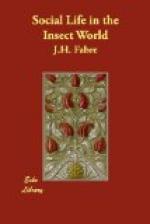The nocturnal Cricket sings continually in the gardens. Each tuft of the red-flowered cistus has its band of musicians, and each bush of fragrant lavender. The shrubs and the terebinth-trees contain their orchestras. With its clear, sweet voice, all this tiny world is questioning, replying, from bush to bush, from tree to tree; or rather, indifferent to the songs of others, each little being is singing his joys to himself alone.
Above my head the constellation of Cygnus stretches its great cross along the Milky Way; below, all around me, palpitates the insect symphony. The atom telling of its joys makes me forget the spectacle of the stars. We know nothing of these celestial eyes which gaze upon us, cold and calm, with scintillations like the blinking of eyelids.
Science tells us of their distance, their speeds, their masses, their volumes; it burdens us with stupendous numbers and stupefies us with immensities; but it does not succeed in moving us. And why? Because it lacks the great secret: the secret of life. What is there, up there? What do these suns warm? Worlds analogous to ours, says reason; planets on which life is evolving in an endless variety of forms. A superb conception of the universe, but after all a pure conception, not based upon patent facts and infallible testimony at the disposal of one and all. The probable, even the extremely probable, is not the obvious, the evident, which forces itself irresistibly and leaves no room for doubt.
But in your company, O my Crickets, I feel the thrill of life, the soul of our native lump of earth; and for this reason, as I lean against the hedge of rosemary, I bestow only an absent glance upon the constellation of Cygnus, but give all my attention to your serenade. A little animated slime, capable of pleasure and pain, surpasses in interest the universe of dead matter.
CHAPTER XII
THE SISYPHUS BEETLE.—THE INSTINCT OF PATERNITY
The duties of paternity are seldom imposed on any but the higher animals. They are most notable in the bird; and the furry peoples acquit themselves honourably. Lower in the scale we find in the father a general indifference as to the fate of the family. Very few insects form exceptions to this rule. Although all are imbued with a mating instinct that is almost frenzied, nearly all, when the passion of the moment is appeased, terminate then and there their domestic relations, and withdraw, indifferent to the brood, which has to look after itself as best it may.
This paternal coldness, which would be odious in the higher walks of animal life, where the weakness of the young demands prolonged assistance, has in the insect world the excuse that the new-born young are comparatively robust, and are able, without help, to fill their mouths and stomachs, provided they find themselves in propitious surroundings. All that the prosperity of the race demands of the Pierides, or Cabbage Butterflies, is that they should deposit their eggs on the leaves of the cabbage; what purpose would be served by the instincts of a father? The botanical instinct of the mother needs no assistance. At the period of laying the father would be in the way. Let him pursue his flirtations elsewhere; the laying of eggs is a serious business.




